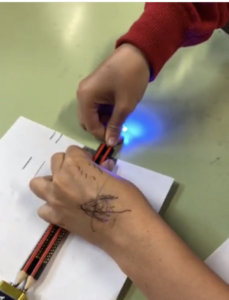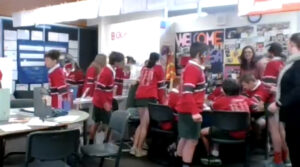
The electrical conductivity of graphite is demonstrated, using pencil marks on paper to complete a circuit and light up a LED
Distance and Covid will not stop science-outreach. Thank you Zoom!**
**not a paid partnership : )
Students at Elsternwick Primary School in Victoria had the opportunity to learn about electrical power, in a hands-on exercise guided by on-screen FLEET members, and following two of the experiments from FLEET’s comprehensive Home Science library.
“A unanimous ‘WOW!’ came from all four classrooms when the LED light lit up, just by connecting two thick pencil tracks to a 9V battery”, says FLEET Research Fellow Peggy Schoenherr (UNSW), who helped guide the kids through the activities.
Some of the students found alternative ways to light the LEDs, discovering for themselves the joy of scientific curiosity-driven experiment.
Jotting down their hypothesis ‘what do you think is happening’ and their conclusions, the class were stepped through a taster of the scientific method
In addition to on-screen coaching, FLEET volunteers ensured success of the experiments by preparing instructional handouts for each of the home-science activities—thanks to FLEET PhDs Mitko Oldfield (Monash) and Yik Lee (RMIT).

Hands-on science is extremely effective in cementing learning, but has made so much more difficult by COVID-restrictions in 2020
An instructional video of the experiment was also provided, as a teaching tool for the educators, by Research Fellows Aydin Keser, Matt Rendell and UNSW Node Administrator Cecilia Bloise’s two children “who agreed to help their mother for the hefty sum of 2 Freddo Frogs each…”
The students also built a small motor using batteries, magnets, and a small piece of copper wire – one of FLEET’s most popular experiments (try it yourself!)
The session was wrapped up with an intro to the FLEET Centre of Excellence by Chief Investigator Nagy Valanoor, who provided background context to directly link the students’ hands-on activities to FLEET’s work on the excess power consumed by computing, as well as the Australian Research Council, who sponsors initiatives like this.
—written by Cecilia Bloise (UNSW)

